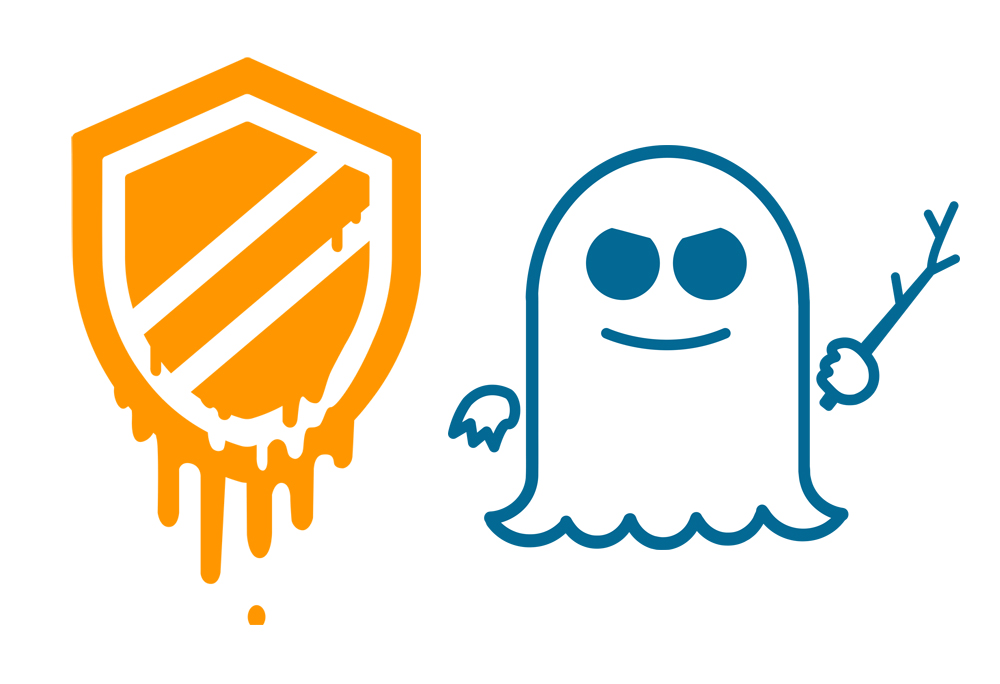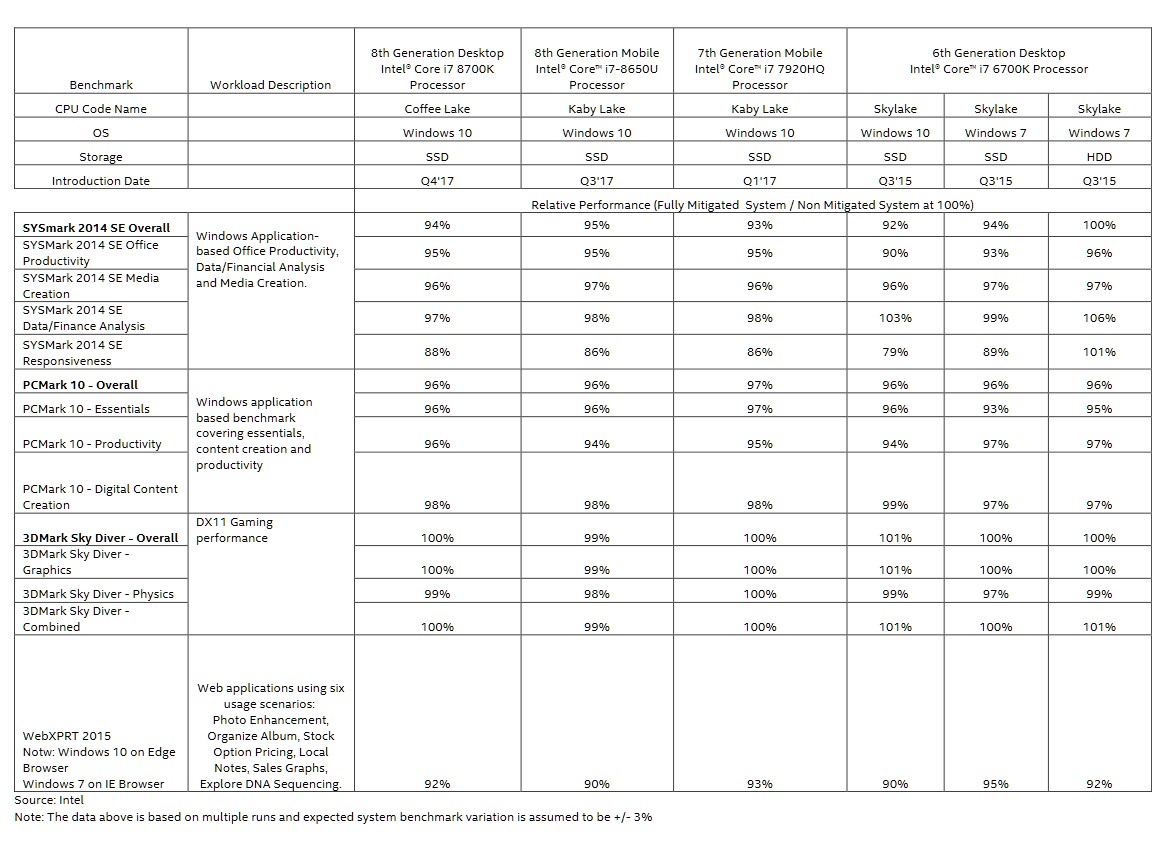Intel Releases Meltdown, Spectre Patch Benchmarks
Intel has released numbers from its own benchmarks on the impact of Meltdown/Spectre patches on Windows, and the results show an up to 21% decrease in benchmark performance for 6th-gen Intel CPUs (Sky Lake).
The Meltdown/Spectre vulnerabilities have been much more than just a blemish on Intel’s reputation. Right from the get-go, it was known that the fixes for it had the potential for a significant performance impact. The immediate follow up from major involved parties seemed to be mild, however. Many independent tests, including our own, also didn’t find any major concerns. Intel’s official stance continued to be that home users would face little impact, while the effect on enterprise would be “highly workload-dependent.”
Many were skeptical, naturally, and believed that Intel and its affected enterprise customers were downplaying the issue. As the issue entered its second week and patches had been rolled out to more customers, however, a different picture was appearing. Epic Games said the patches were responsible for a huge performance hit on its cloud service provider, which caused instability in servers for Fortnite. Microsoft, which was among those downplaying the issue before, said that they had recorded significant performance impacts on Windows 7.
For what it’s worth, Intel hasn’t been entirely silent on the developing issue. Until now, the only official number from it was an up to 14% performance decrease in a benchmark of SYSmark 2014 SE for an 8th-gen Intel CPU. Intel released the full numbers from its benchmarking, however, and they aren’t nearly as rosy.
For the directly comparable numbers, Intel benchmarked Windows 10 running on 8th-gen (Coffee Lake), 7th-gen (Kaby Lake), and 6th-gen (Sky Lake) desktop and mobile CPUs with an NVMe SSD. Across the board, the biggest impact was to the SYSMark 2014 SE Responsiveness benchmark, which saw drops from 12% on an i7 8700K to 21% on an i7 6700K.
This test is heavily affected by storage performance, so Intel’s numbers show there is definitely a concern that SSD performance could be seriously impacted. Other numbers showed less impact, with the second most affected being the Office Productivity benchmark, which had a 5% and 10% drop on the respective processors. This test is heavily affected by CPU performance and is the only test that includes web browsing.
Intel is still downplaying the issue by stating that the overall impact only ranges from 6% to 8%, but we think even 8% on a two-year-old CPU is pretty significant. Intel even somewhat ironically highlights the lack of performance impact on hard drive-equipped systems as if they weren’t in the business of selling SSDs. At least Intel is committing to releasing more benchmarks soon.
Get Tom's Hardware's best news and in-depth reviews, straight to your inbox.
The full results from Intel's first tests are below.
-
larkspur Interesting that the SysMark tests show less overall impact on the Win 7 system than on the Win 10 system. I'm guessing that those differences are attributable to Intel using an NVMe SSD on the Win 10 system and a SATA SSD on the Win 7 system? Much like the system with the HDD has the least negative impact. Any thoughts on that?Reply -
redgarl Bios and software are not patched, and we all know at the minute you are multi-tasking, alot of the performances goes down the toilet. Some are reporting more than 30% performance lost in the server or business enterprise softwares.Reply
It`s a damn mess and Microsoft proved it themselves by forcing a buggy patch on old AMD CPUs. It is far from over and it will only get worst as more patches will be needed.
Shame on Microsoft for not creating a Meltdown patch and a Spector patch instead of a single patch. AMD doesn`t need the first one but they force the users to swallow a botched work. -
shehchao.sim IMHO, how it impact users depends on what the computer is used for. IF you are using the computer for gaming, youtube, facebook and surfing internet. I don't think it really matters.Reply
Although it does shows 14% impact for office applications, most of these users are just using word, excel, powerpoint...outlook.....again, insignificant (CPU is idle most of the time).
Hence, I would say it will affect enterprise and data centers rather than end users. I feel that even if end users don't patch, it doesn't really matters. Software issues are a far bigger concern than this. We have already seen so many exploits and company servers being hacked to reveal customer data and even CC data. Nothing to do with spectre and meltdown..... -
AlistairAB There are lots of ancillary problems. It killed some AMD systems. It killed Asus AI Suite and fan control... these patches aren't that simpleReply -
bit_user Reply
So, that's why it's good we now have data.20586183 said:IMHO, how it impact users depends on what the computer is used for. IF you are using the computer for gaming, youtube, facebook and surfing internet. I don't think it really matters.
I think the point of these benchmarks is to show the user-perceivable impact. So, a well-designed "Responsiveness" test should serve as an indication of how responsive the system feels. Unless you have some information about why the benchmark fails to reflect that, then I think it should be taken at face value.20586183 said:Although it does shows 14% impact for office applications, most of these users are just using word, excel, powerpoint...outlook.....again, insignificant (CPU is idle most of the time).
As for the other tests, they're designed to reflect various other situations where the computer's performance is noticeable by users. While it's true that not everyone needs a high-end rig, it's really up to the user to decide whether a benchmark is relevant to them (i.e. "do I sit around, waiting for the computer to do media creation, productivity, etc.?").
Personally, I almost never have to wait for my productivity apps, but then I'm a pretty light-weight user of such programs. The two most relevant operations for me are web browsing (and yes, certain page loads easily spike my CPU - it's not 1995 any more) and software builds. As incremental builds are highly I/O bound, I think the impact will definitely be significant for them.20586183 said:Hence, I would say it will affect enterprise and data centers rather than end users.
That's an interesting philosophy on security. I doubt anyone who's ever been infected with malware would agree that known vulnerabilities should go unpatched. Effective security depends on a layered approach, and without patching these vulnerabilities, it might be possible for someone to combine them with a vulnerability in a web browser to gain admin privileges. That's a big deal.20586183 said:I feel that even if end users don't patch, it doesn't really matters. Software issues are a far bigger concern than this. We have already seen so many exploits and company servers being hacked to reveal customer data and even CC data. Nothing to do with spectre and meltdown.....
Sorry to be tough, but you're new and your points read like they're straight from a script out of Intel's PR. I agree that the most serious performance issue is going to be faced by cloud providers & appliance vendors that suddenly need to add more capacity, but I think your views on security are out of step with the times. -
bit_user BTW, the delicious irony, in all of this, is that using Intel's own 3D XPoint storage products will only magnify the impact.Reply -
thuck777 I am not willing to sacrifice the kind of performance noted for my Windows 7 laptop running a Sandy Bridge i7 CPU. That is stupid, especially given that there really is NO threat. Now that so many systems are going to be updated, there is little reason for any scumbags to try to exploit these vulnerabilities, IMO. From my perspective, the cure is far worse than the disease, especially on older hardware / OS combinations. It just is not worth it. So, I believe Microsoft should make a way to have these patches be OPTIONAL and AVOIDABLE and UNINSTALLABLE. This is crap!Reply -
Immitem I installed all patches for my z620 running W7 and 2 E5-2680s v2 and have seen no differences in Cinebench r15. That is assuming I got the right ones and I still have to wait and see if HP releases a BIOS patch that goobers things up. Even though I saved a lot of money going this route over Threadripper I am starting to kick myself as even though my computer does everything I want it to and more it might be all for naught in the near future.Reply
If push comes to shove then I would rather take my system offline and build a super cheap Ryzen web-browser. -
Tanyac Even if the performance hit were only two percent it's still unacceptable!Reply
People bought the higher end CPUs to get performance out of them. Who buys a 6700K or 8700K when an 6400 / 8350 will for most games suffice?
Then to have this come along and suck the very life out of our CPUs.. Pushing us back essentially two generations or down several models of CPUs. That cost of that across the board has got to be nothing short of phenomenal!
And the message seems to be clear.. Upgrade to Windows 10, as Windows <10 are being hit harder. I'm surprised we haven't seen the tin foil hat group start saying this is another Microsoft/Intel collusion to force sales of Intel upgrades and Windows 10 (Though I wonder how the exploits here are going to help Intel's sales at all).
I just spent more $3000 upgrading my PC to a I9-7900 (~ $1900 AUD counting delidding), and $750 for a top end motherboard + an upgrade of my 950 pro 512 to a 960 Pro 1TB and a new 280mm cooler with Noctua NF-A14 PWM iPPC fans to keep it all cool. It's clear what I'm after - every ounce of performance I can scrape out of the system.
And Correct me if I'm wrong - the patches are part of the cumulative updates. So the only way to avoid them (but why would you want to?), is essentially to never install another patch on Windows...
God, what a mess :( -
bit_user Reply
Cinebench shouldn't be much affected, as it's mostly doing userspace computation rather than making lots of calls into the kernel (i.e. as would be used for I/O-heavy workloads).20586517 said:I installed all patches for my z620 running W7 and 2 E5-2680s v2 and have seen no differences in Cinebench r15.
Why would it be for naught? If you mainly wanted to do gaming and/or 3D rendering, the impact should be minimal.20586517 said:I am starting to kick myself as even though my computer does everything I want it to and more it might be all for naught in the near future.

